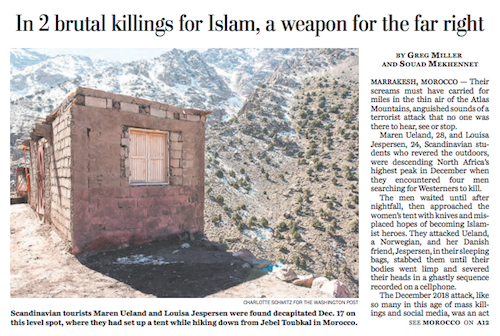The Washington Post cranks out a lot of objectionable ideas, but its Sunday front page story portraying the sharia murder of two young Scandinavian women as an opportunity for the “far right” went way too far on so many levels, beginning with accuracy and fairness.
![]()
Let’s consider. For years, persons concerned about the mass immigration of hostile Muslims have pointed out that the “religion” of Islam is more correctly understood as an all-encompassing political system. Dutch political leader Geert Wilders lives under 24/7 security because jihadist thugs in Europe have decided he needs to be murdered due to his resistance to the ideology. When Wilders gave a 2015 speech in Garland, Texas, he had a SWAT team of eight well armed men guarding him.
Wilders discussed the political nature of Islam in a 2017 interview, reviewed in Breitbart.com: Geert Wilders: Islam Is Not a Religion, It’s a Totalitarian Ideology:
GEERT WILDERS: Islam as an ideology does not allow freedom. Look at almost all the countries in the world where Islam is dominant — you see a total lack of civil society, of rule of law, of freedom for journalists, women, Christians, or even somebody who wants to leave Islam, an apostate.
You are allowed to leave Christianity or Judaism and become an atheist or the follower of another religion; you are not allowed to leave fascism, you are not allowed to leave Communism. And still today in Holland, in Germany, in the Arab world, the penalty is death if you want to leave Islam.
And let’s not forget the extreme violence, the murders where muslims kill nonbelievers because the koran says to do so in over 100 verses. There are so many examples — like the 9/11 attacks that killed nearly 3000.
It was so shocking that America pledged never to forget.
![]()
But the Washington Post has forgotten that Islam is a historic opponent of the West, and the paper should not condemn those of us who do remember and name the enemies of free people.
Perhaps if the press were not so politically correct in protecting the reputation of hostile Islam, the two young women would have thought twice about a hiking trip in Morocco (99 percent Muslim). The media adoration of diversity über alles does not stand up under scrutiny.
Below, Norwegian Maren Ueland (left) and Dane Louisa Vesterager Jespersen were murdered in Morocco by jihadists.
![]()
Murder in the Atlas Mountains, Washington Post, June 21, 2019
In a crime apparently intended to impress the Islamic State, two Scandinavian women were brutally slain in Morocco. The killings were seized on by the far right to attack Islam.
MARRAKESH, Morocco — Their screams must have carried for miles in the thin air of the Atlas Mountains, anguished sounds of a terrorist attack that no one was there to hear, see or stop.
Maren Ueland, 28, and Louisa Jespersen, 24, Scandinavian students who revered the outdoors, were descending North Africa’s highest peak in December when they encountered four men searching for Westerners to kill.
The men waited until after nightfall, then approached the women’s tent with knives and misplaced hopes of becoming Islamist heroes. They attacked Ueland, a Norwegian, and her Danish friend, Jespersen, in their sleeping bags, stabbed them until their bodies went limp and severed their heads in a ghastly sequence recorded on a cellphone.
The December 2018 attack, like so many in this age of mass killings and social media, was an act of senseless and performative violence. The killers, poor and uneducated, became absorbed in a violent Islamist universe they saw on the screens of their cellphones, then sought their own place in it. Their overriding aim was to impress the Islamic State, earn the status of soldiers in its apocalyptic struggle and see their own recording distributed across the group’s propaganda platforms.
Reality didn’t follow that script. The targeting of defenseless women and the abysmal quality of the recording managed to violate the standards of a terrorist group not known for having any. The Islamic State did not distribute the video, refused to acknowledge the attack and to this day has ignored the Moroccans’ pledges of loyalty.
The video went viral nonetheless. An attack that had gone unheard and unseen ended up being viewed millions of times by Islamic State supporters who didn’t share the group’s selectivity, by dark-Web bottom dwellers devoted to gore and by the morbidly curious.
The most alarming audience, however, was one that the attackers had not envisioned. Within days, the one-minute, 16-second recording spread rapidly across networks associated with the far-right and white-nationalist movements. Extremists posted gruesome scenes of the women’s deaths on Facebook, Twitter and other platforms alongside condemnations of Islam and calls for a civilizational clash.
“Look at this video of the one girl being decapitated alive,” wrote a far-right figure in Norway as he posted a link to his Twitter account. “It’s God awakening us Germanic men to action. It’s enough now. It’s enough.”
When officials in Norway and Denmark pleaded with the public to stop sharing the video, that effort was denounced by far-right groups as a betrayal of religion and race — censorship of content that revealed the true nature of Islam.
For families of the victims, the aftermath compounded the pain. Their mothers were inundated with messages on Facebook. Many were expressions of condolences, but some were gestures of astonishing cruelty, saying their daughters deserved to die and attaching links to the video of their slaughter.
The attack in Morocco was not of the same magnitude as the mass shooting that killed 51 people at mosques in New Zealand three months later, or the Easter bombings in Sri Lanka five weeks after that, when more than 200 people attending church services were killed. But all are part of a pattern of violence and viral incitement in which the extremes of intolerance react to and further radicalize one another online.
In the Moroccan case, a video that was created to strike a blow for Islamism was almost immediately repurposed and weaponized by those who consider the religion an existential threat to the ethnic and cultural identity of Northern Europe.
The victims were caught between warring ideologies that they had rejected in life. In the days after the attack, far-right activists scoured the women’s social media accounts and mocked them for their tolerant views.
“It is obvious to point out the naivete of the two deceased, but they are, as all, a product of their upbringing,” said an entry on Uriasposten, a Danish, anti-Islamic website. “Perhaps the eternal struggle against ‘prejudice’ has unpleasant side effects.”
This account of the attack in Morocco and its aftermath online is based on Moroccan court records including statements from the suspects; interviews with officials in Morocco, Norway, Denmark and the United States; and friends and relatives of the victims and of the suspects in their deaths. (Continues)
















